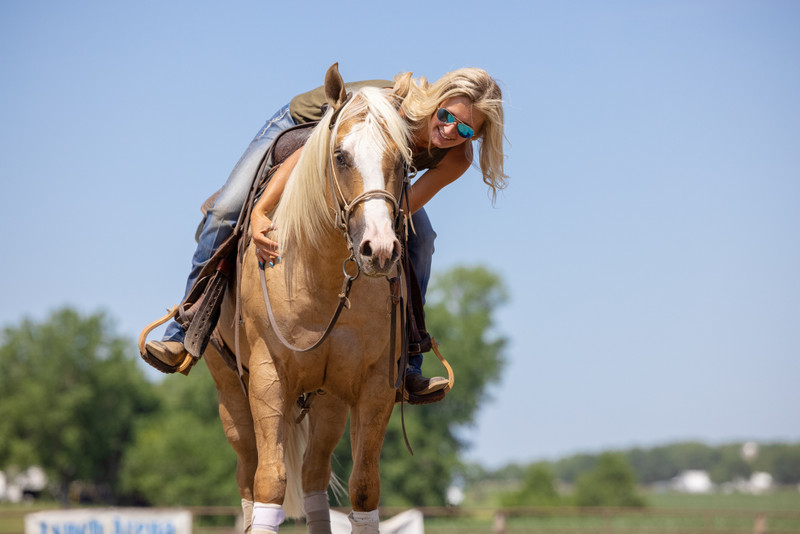Proper care and prevention help promote your horse’s overall health and performance. Here are four challenges your horse may face this summer and what you can do to help prevent these health concerns from happening.
Gastric Upset
Horses undergoing rigorous training, regular hauling, and long periods of stalling are at a higher risk for gastric upset. This is often due to increased level of stress they experience daily during the height of summer months. It is also common for horse owners to want to increase their horses grain intake to help meet increased energy demands during this time, which can also be a concern for gastric discomfort. It is always important to read feed labels and understand the amount of starch and sugars you are feeding. While starch helps produce energy, too much starch can disrupt the pH in the digestive system.
There are several steps you can take to help support good gastric health for your horse. Free-choice forage provides constant stream of saliva which helps to neutralize/buffer stomach acids naturally. A slow feed hay net can help mimic the grazing process, encouraging slower consumption for longer periods of time. By providing hay during trailer rides and waiting at events, you are helping reduce some discomfort brought on by an empty stomach. Be familiar with your horse’s triggers for stress and do what you can to help make them more comfortable. While trying to help horse feel their best, we urge you to avoid unprescribed use of NSAID’s such as bute. While NSAID’s can help horses manage pain and inflammation, always be sure to discuss with a veterinarian prior to use as this can also wreak havoc on your horse’s digestive function. Adding a daily gastric support product to your horse’s diet can also help promote gastric health.
Gastro-Plex pellets provide your horse a daily dose of high level active ingredients to help restore natural microbial balance and support healthy digestive function. Gastro-Plex paste is another great option during events and travel. Gastro-Plex paste coats and soothes a horse’s stomach which helps suppress the abrasiveness of gastric acid that can cause stomach upset/irritation.
Compromised Immune System while Traveling
The immune system’s primary role is to defend the body from foreign invaders or abnormal cells that invade or attack it. When your horse's immune system is compromised, they are at greater risk for infection or illness. Ensuring your horse’s immune system can defend against infection is especially important during the summer as they are faced with the added stress of training, travel, and competition.
Optimal care of the immune system is accomplished through proper nutrition, good care and maintenance, and taking measures to help reduce your horse’s stress. To help your horse during travel, it is beneficial to keep travel less than 12 hours at a time. Make an effort to stop a few times throughout the day to let your horse rest, offer water at each stop, and provide good ventilation and airflow in the trailer.
There are many ingredients that help strengthen the horse’s natural defense including Vitamin E, Vitamin C (Ester-C), Turmeric, and probiotics. And as an added bonus, many MVP products already include ingredients support your horse’s immune system such as Exceed 6-Way, Air-Way EQ, Eclipse’ PM, Gastro-Plex, and In-Sync.
Allergies
During the summer, horses can encounter a wide variety of allergens every day. The more allergens a horse is exposed to the higher chance there is for a reaction to occur. This reaction is the immune system’s response what the body sees as harmful and can be caused by a wide variety of substances. Equine allergies primarily affect the skin, such as itching or hives, and/or the respiratory system, such as coughing or nasal discharge. Common horse allergens include:
- Skin allergens – insect bites, products/chemicals applied to horses (fly sprays, shampoo, etc)
- Respiratory allergens - airborne particles of mold, dust, and pollen
- Ingested allergens – sensitivities to grasses, weeds, or additives in feeds. Can also include medications, dewormers, and/or vaccines.
The first line of defense in most allergic conditions is to eliminate the cause or avoid contact with the allergen. By limiting the number of allergens your horse is exposed to you can improve your horse’s allergy symptoms or possibly prevent future allergy flair-ups. Feeding a balanced diet with specific ingredients that promote healthy immune response and respiratory function can help keep the horse’s body prepared against allergens and seasonal outbreaks. Air-Way EQ provides daily support for respiratory function, containing comprehensive ingredient support for healthy soft tissue throughout the respiratory tract and helps promote a natural immune response to seasonal allergies.
Risk of Dehydration
Dehydration can happen any time of the year, but especially during the summer months and can cause serious health concerns. When horses sweat, water is lost and at risk for dehydration if they are not drinking enough water to replace lost fluids. You can recognize dehydration in your horse relatively easy. Horse may appear lethargic (sluggish/slow/tired), have dull, glazed eyes as well as dark red gums. Another good indicator of dehydration is to pinch skin on neck/shoulder - take note of how quickly it springs back. If dehydration is present skin will stay elevated for a few seconds.
To prevent risk of dehydration, ensure your horse has plenty of fresh water available all times of the day, even after exercise. Tip: lukewarm water is best for maximizing consumption! When discussing dehydration, you often hear about the importance of electrolytes. Electrolytes are common minerals that work together to maintain physiological equilibrium in active horses, these minerals are lost every time your horse sweats. Electrolyte deficiency can lead to dehydration, so feeding electrolytes helps replaces lost minerals and will help keep your horse hydrated by encouraging him to drink.
MVP offers two electrolyte products: Electro-Cell paste and Apple-Lyte, an apple-flavored powder. Water laced with electrolytes can help keep its body in balance. However, whenever you offer electrolytes such as Apple-Lyte mixed in water, be sure to offer a second source of fresh water, as well. Not all horses will drink electrolyte-laced water, so providing a source of water without them will ensure your horse keeps drinking.
While summertime means more competition and traveling, it also means your horse at risk for higher levels of stress. Knowing your horse and their stressors is important, so that you can take those steps to help minimize their risk for these health challenges. Proper care and prevention are crucial to help promote your horse’s overall health and performance this summer.


